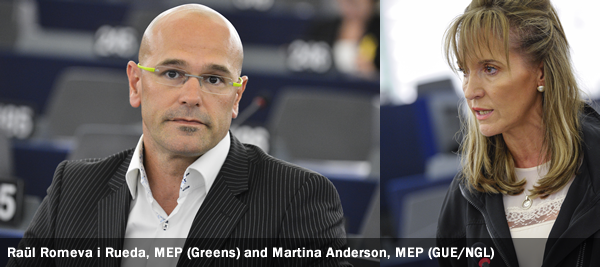Women are the first to suffer the brutality of war and are largely ignored during peace negotiations. “This state of affairs must change,” said Nahla Valji, New York office of UN Women. Valji was speaking at the European Parliament at a debate on the inclusion of women within the current Colombian peace talks.
Valji said: “…without the inclusion of women, peace is extremely fragile. The new UN resolution 2122, recently passed by the Security Council, which reinforces resolution 1325, establishes stronger measures to enable women to participate in conflict resolution.”
Martina Anderson, MEP (GUE/NGL), a former member of the Irish Republican Army jailed for firearms and explosives offences – though she has since renounced violence – insisted that women may be the most important players during the signing of peace accords and especially in the reconstruction phase. “If women continue to be marginalized, peace will be harmed in practice, because it is women who lead the daily struggle for both family and social reconstruction”.
MEPs Raül Romeva i Rueda (Greens), Marc Tarabella (Socialists) said this important debate brought to light the urgent need for women to be included in negotiations for peace and reconstruction processes, and that their proposals are reflected in peace agreements, because women, and their children, are the primary victims of armed conflict.
Romeva i Rueda remarked: “We Europeans are obliged to contribute to the equality of women both in our continent and elsewhere in the world. And when it comes to conflict resolution, we need to stress that the door must be opened to women both in their roles as mediators and in the reconstruction of society.”
Thirteen years on since the signing of UN resolution 1325 on women, peace and security, a milestone for the recognition of women by the international community as essential actors for lasting peace, the civil society networks Oidhaco and Grupo Sur arranged the discusion at the European Parliament in Brussels, to explain to deputies why it is essential for women to be taken into account in the current negotiations, negotiations being conducted by the Colombian government with the FARC guerrillas.
Clara Murguialday, an expert in the peace process in El Salvador, and president of the organisation Cooperacció, recalled the experience in her country: “The Salvadoran experience taught us that in order to build a culture of sustainable peace we must devote resources not only to the physical and economic reconstruction of a country, but also to emotional reparation for women who have been displaced, returned or have been involved with the guerrilla”.
More than a year after the start of the talks between the Colombian government and the FARC in Havana, women and other victims are conspicuously absent from this process. Adriana Benjumea, from the Colombian organisation Women for Peace (Mujeres por la Paz), explained the solitude of Colombian women war victims, who together with their sons and daughters, make up over 70 % of the 5.5 million internally displaced persons in Colombia.
“The government and the FARC must listen to women and allow their requests to be reflected in the agreements. Women must play a role in the post-conflict stage, because if they are left out, the peace that we long for in Colombia will not be achieved, and women will be the ones who continue to endure violence without anything being done to prevent it, as has been the case up to now”.
Meanwhile, Gloria Flórez, member of the Andean Parliament and of the Europe/Latin American EuroLat Assembly, sent a message from Colombia highlighting the historic opportunity of the Havana dialogue in moving towards peace building, and insisted that the inclusion of women in this process is essential to the credibility, strength, durability and legitimacy of peace.
Brussels-based organisations Oidhaco and Grupo Sur warned that it is difficult to achieve lasting peace without the involvement of women. Oidhaco spokesperson Vicente Vallies reminded the EU that it has a responsibility to comply with its own resolutions on this issue. “Now that there is hope that Colombia can find a way to achieve peace, the EU should insist that this country promotes the participation of women in the peace talks and in what is sure to be a long period of reconstruction and reconciliation”.
